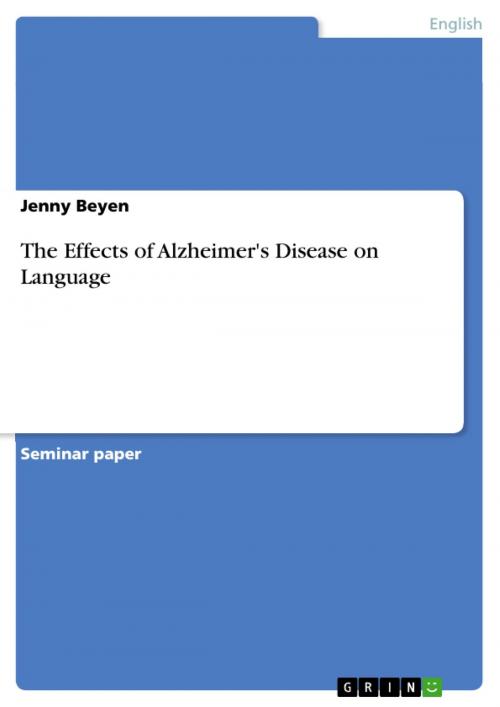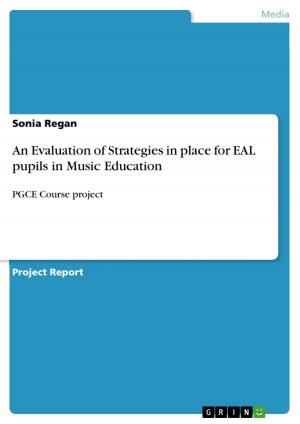| Author: | Jenny Beyen | ISBN: | 9783640581719 |
| Publisher: | GRIN Publishing | Publication: | March 31, 2010 |
| Imprint: | GRIN Publishing | Language: | English |
| Author: | Jenny Beyen |
| ISBN: | 9783640581719 |
| Publisher: | GRIN Publishing |
| Publication: | March 31, 2010 |
| Imprint: | GRIN Publishing |
| Language: | English |
Seminar paper from the year 2009 in the subject English Language and Literature Studies - Other, grade: 3,0, RWTH Aachen University, language: English, abstract: Alzheimer's Disease (henceforth 'A.D.') is generally diagnosed in people over the age of 65. So when the world populations becomes older and more persons over the age of 65 populate the world, the disease spreads. By 2006, the number of A.D.-patients had already increased to 26.6 millions. This number is assumed to quadruple by 2050. But an improved A.D.-research would not only help those persons who suffer from it: 'Alzheimer's Disease offers the challenge not only of delineating the writing disturbance of a common neurodegenerative illness but also the opportunity to discern how widespread neocortical deafferentation affects the neurobehavioral underpinnings of a complex cognitive task such as writing.' (Glossar et al., 2000:78) Why especially the examination of language in A.D.-patients can promote the general study of language a great deal is also pointed out by Obler et al. (1999:92): 'The language of dementing patients presents a unique opportunity for examining the relationship between language and cognition. The pattern of dissociation of abilities in dementia can yield information regarding the normal relationship - dependence or independence - between language and more general cognitive abilities. [...] To study language production and comprehension abilities in dementing patients is to explore the boundaries between syntax and semantics and among semantics, real world knowledge, and reasoning abilites.' In this termpaper I will show that A.D. has severe effects on the patients' language and that it is primarily caused by an impaired memory. During the second chapter, I will give a brief overview of the disease in general, i.e. the history of A.D., the insights and damages of A.D.-patients' brain and body, and the different stages of this disease. Chapter 3 will present a selection of the most common effects of A.D. on language. The fourth chapter will close with a short summary of the termpaper and a conclusion.
Seminar paper from the year 2009 in the subject English Language and Literature Studies - Other, grade: 3,0, RWTH Aachen University, language: English, abstract: Alzheimer's Disease (henceforth 'A.D.') is generally diagnosed in people over the age of 65. So when the world populations becomes older and more persons over the age of 65 populate the world, the disease spreads. By 2006, the number of A.D.-patients had already increased to 26.6 millions. This number is assumed to quadruple by 2050. But an improved A.D.-research would not only help those persons who suffer from it: 'Alzheimer's Disease offers the challenge not only of delineating the writing disturbance of a common neurodegenerative illness but also the opportunity to discern how widespread neocortical deafferentation affects the neurobehavioral underpinnings of a complex cognitive task such as writing.' (Glossar et al., 2000:78) Why especially the examination of language in A.D.-patients can promote the general study of language a great deal is also pointed out by Obler et al. (1999:92): 'The language of dementing patients presents a unique opportunity for examining the relationship between language and cognition. The pattern of dissociation of abilities in dementia can yield information regarding the normal relationship - dependence or independence - between language and more general cognitive abilities. [...] To study language production and comprehension abilities in dementing patients is to explore the boundaries between syntax and semantics and among semantics, real world knowledge, and reasoning abilites.' In this termpaper I will show that A.D. has severe effects on the patients' language and that it is primarily caused by an impaired memory. During the second chapter, I will give a brief overview of the disease in general, i.e. the history of A.D., the insights and damages of A.D.-patients' brain and body, and the different stages of this disease. Chapter 3 will present a selection of the most common effects of A.D. on language. The fourth chapter will close with a short summary of the termpaper and a conclusion.















